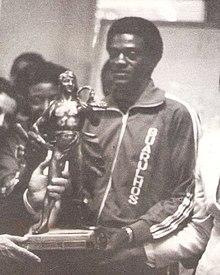sport.wikisort.org - Athlete
João Carlos de Oliveira, also known as "João do Pulo" (May 28, 1954 – May 29, 1999) was a Brazilian athlete who competed in the triple jump and the long jump.[1]
Born in Pindamonhangaba, São Paulo De Oliveira won two Olympic bronze medals. His personal best of 17.89 metres, set on October 15, 1975 in Pan American Games, stood as the world record until 1985. As of today, it is still in the top twenty of all-time best results in the event.[1]
Career
Orphaned by his mother, he started working at the age of seven, as a car washer. In 1973, coached by Pedro Henrique de Toledo, he broke the junior triple jump world record at the South American Athletics Championships with the mark of 14.75 m. In 1975, already as an adult athlete at the Pan American Games in Mexico City, the corporal of the Brazilian Army won the gold medal in the long jump with the mark of 8.19 m and, on October 15, also the gold medal in the triple jump, with the incredible mark of 17.89 m, breaking the world record of this modality in 45 cm, that belonged to the Soviet Viktor Saneyev.
He was the gold medal favorite in the triple jump at the Montreal Olympics, but, recovering from belly surgery, he jumped just 16.90 m and was surpassed by Saneyev (17.29 m) and the American James Butts (17.18 m), taking the bronze medal. In addition, he was fourth in the long jump. At the Pan American Games in Puerto Rico, he became twice champion in both the triple jump and the long jump, accumulating a four-time Pan American championship in two events. In the latter, he defeated none other than the future four-time Olympic champion of the event, Carl Lewis.
There exists some doubt on the judging of the 1980 Olympic men's triple jump final. Several jumps of winning distance by both Oliveira and Ian Campbell of Australia were adjudged as fouls by the all-Soviet judging panel, despite video replays showing this was not the case. One of Oliveira's jumps was estimated to be a new world record beyond eighteen metres. These decisions resulted in Soviet athletes Jaak Uudmäe and Viktor Saneyev winning the competition with performances in the low 17-metre area. Harry Seinberg, coach to Uudmäe, confirmed off-the-record that the judging had leaned in favour of the home athletes.[2][3]
Only in 2000, twenty years after the Moscow Games, the Australian newspaper The Sydney Morning Herald, the largest in Australia, made a major report demonstrating that the Brazilian's canceled jumps were part of a Soviet operation to give Saneyev the fourth Olympic title. The plan didn't work out because of Uudmäe's best jump, but even so, the gold medal went to the USSR.[4]
In contrast to the lack of luck in the Olympics, in the pre-World Championships in Athletics, João do Pulo was three-time world champion in the triple jump in 1977 (in Düsseldorf), 1979 (in Montreal) and 1981 (in Rome, with 17.37 m, beating Jaak Uudmäe, a year after the Olympics, and future world record holder Willie Banks of the United States). Flag bearer of Brazil in the opening parade in Montreal 1976 and in Moscow 1980, João was the main idol of the Brazilian sport between 1975 and 1981.[5]
Death
In 1981, he was in a car accident near São Paulo in which he lost one leg. Afterward, he became a vocal advocate for the rights of the disabled. He died in 1999 from complications of alcoholism.[6]
His world record was only broken almost ten years later, by the North American Willie Banks, with 17.90 m, in Indianapolis, on June 16, 1985. His Brazilian and South American record was only broken more than twenty-one years ago. later, by Jadel Gregório, with 17.90 m, in Belém, on May 20, 2007 (who coincidentally was also an athlete of João do Pulo's former coach).[7]
References
- "João Carlos de Oliveira". Sports Reference. Archived from the original on 17 April 2020. Retrieved 7 September 2016.
- Série de documentários retrata a emoção do esporte (in Portuguese). Estadao (2014-12-02). Retrieved 2018-04-01.
- Lane, Tim (2013-08-13). Cheating the only conclusion you can jump to. Sydney Morning Herald. Retrieved 2018-04-01.
- Há dez anos, o Brasil perdia João do Pulo
- Há dez anos, o Brasil perdia João do Pulo
- Há dez anos, o Brasil perdia João do Pulo
- Há dez anos, o Brasil perdia João do Pulo
На других языках
- [en] João Carlos de Oliveira
[es] João Carlos de Oliveira
João Carlos De Oliveira (Brasil, 28 de mayo de 1954-29 de mayo de 1999), también conocido con el apodo de João do Pulo, fue un atleta brasileño, especializado en la prueba de triple salto en la que llegó a ser plusmarquista mundial y medallista de bronce olímpico en Montreal 1976 y Moscú 1980.[1][fr] João Carlos de Oliveira
João Carlos de Oliveira, né le 28 mai 1954 à Pindamonhangaba et décédé le 17 mai 1999 à São Paulo, était un athlète brésilien spécialiste du saut en longueur et du triple saut, discipline pour laquelle il a détenu le record du monde durant près d'une décennie.[it] João Carlos de Oliveira
João Carlos de Oliveira, detto João do Pulo (Pindamonhangaba, 28 maggio 1954 – San Paolo, 29 maggio 1999), è stato un triplista e lunghista brasiliano, medaglia di bronzo ai Giochi olimpici di Montréal 1976 e Mosca 1980 nel salto triplo.[ru] Оливейра, Жуан Карлуш ди
Жуан Карлуш ди Оливейра (28 мая 1954[1], Пиндамоньянгаба, Сан-Паулу — 17 мая 1999, Сан-Паулу) — бразильский легкоатлет, двукратный бронзовый призёр олимпийских игр (1976, 1980) в тройном прыжке, экс-рекордсмен мира в этой дисциплине.Другой контент может иметь иную лицензию. Перед использованием материалов сайта WikiSort.org внимательно изучите правила лицензирования конкретных элементов наполнения сайта.
WikiSort.org - проект по пересортировке и дополнению контента Википедии
